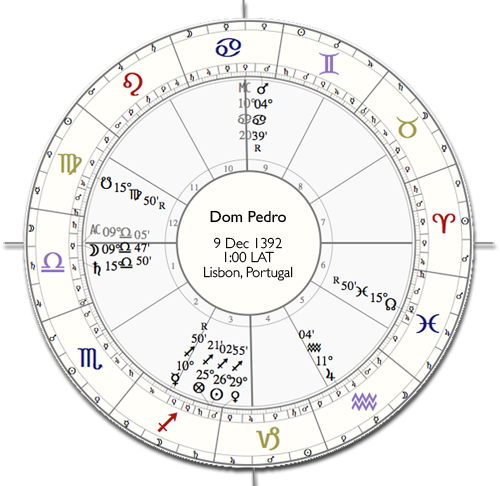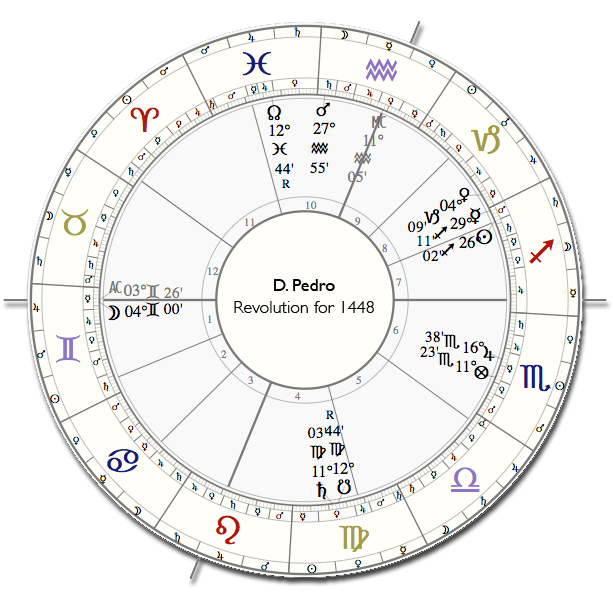
Murder, She Wrote: the strange case of the medieval sniper
Being an enthusiastic student of history and having the habit of scrutining ancient chronicles in search of the birth data of historical figures, I am always thrilled when I eventually find such data. This is the case of the Portuguese Duke Dom Pedro, whose birth data can be found in the Chronicle of Fernão Lopes [1] . Dom Pedro was the second son of King João I and Queen Philippa of Lancaster (herself the first child of duke John of Gaunt and Blanche, Duchess of Lancaster). Here is his natal chart, calculated for the 9th December 1392, 01:00 am LAT (Local Apparent Time), Lisbon, Portugal.

The most evident feature of this chart is of course the Moon conjunct the Ascendant, suggesting movement, adaptability and popularity; the latter is further emphasised because the Moon rules the MC. The Moon is in airy and sanguine Libra, another strong sign of sociability and politeness. The Moon in 4th quarter adds a phlegmatic note to his behaviour, thus making him somewhat shy and introverted. “He was graceful in speech – the chronicler says – and his sentences were grave and substantiated”.
Saturn in the 1st house also contributes to the reserved side of his nature, but as it is strongly dignified by exaltation, triplicity and face, results in a courteous and somewhat sophisticated manner. “He was liberal in the right measure (…) and he delighted in study”. Indeed, he was exceptionally intelligent and cultured, having translated into Portuguese some of the classical Latin works. Saturn is also the almutem of this chart, which confers upon him a pronounced sense of individuality. Among his brothers and sisters, he was called ‘the English one’, that is, the one closest to the English style and character of his mother, Phillipa.
 As to his physical appearance, it was also determined by Saturn as all the chroniclers describe him as having a “long face… thick nose…and coarse hair”. As to the Moon, it can be detected in his ‘dull eyes’ – definitely an accurate description, although not a very pleasant one.
As to his physical appearance, it was also determined by Saturn as all the chroniclers describe him as having a “long face… thick nose…and coarse hair”. As to the Moon, it can be detected in his ‘dull eyes’ – definitely an accurate description, although not a very pleasant one.
He had a great devotion to the Archangel Michael, and because of that the adopted the archangel’s symbol of the Scales in his coat of arms. Could it be just a coincidence that is Ascendant is Libra, the scales?
He travelled widely, visiting the courts of London, Bruges, Venice, Rome, Germany, Hungary and Spain. All these travelling brought him the nickname of ‘prince of the seven corners of the world’. Travels are suggested by the angularity of the Moon and Mars which is still conjunct to the MC, although debilitated, in moveable signs. Also the ruler of the 9th house, Mercury is in the 3rd, closely aspecting the Ascendant and the Moon, therefore promising several journeys, both short and long. The main motivation for his travels was definitely mercurial; he wanted to learn and to experience new places and new people. For him, the words ‘prince’ and ‘wise’ “should be one and the same thing”.
But as both Mars and Mercury are debilitated and retrograde, there is some difficulty or discomfort related to travel and learning. In fact, the other reason for his travels was that he felt undervalued.
As the second son of the king, Dom Pedro was not meant to reign, however, his natal chart says otherwise, as it places the ruler of the MC in the Ascendant. In fact, a complex set of circumstances led him to a position of great power.
His older brother, Dom Duarte[2], died in 1338 at the age of 47, a victim of the plague. He left his six year old son, Afonso, as heir to the throne. The obvious regent for the kingdom was the dowager queen, but she was rejected by some because of her Spanish ascent, and eventually ‘invited’ to return to her natal Castille. Being Afonso’s paternal uncle, Dom Pedro was the next logical choice as regent. Life at court was not what he had planned. He had intended to retire to his duchy near Coimbra, to study and work in translations, but he decided to accept. He ruled wisely and capably, for an entire decade. During that time, he developed a good relationship with his nephew, and even after the young king’s coronation he maintained his position as political adviser and favourite uncle. He also arranged Dom Afonso’s marriage with a suitable bride – which coincidentally happened to be his daughter. Wise man, indeed.
But during all the time of Dom Pedro’s rulership some factions at court had been undermining his work and poisoning his relationship with his nephew. In Dom Pedro’s chart Mercury rules the 12th house of secret enemies, thus pointing to intellectual, argumentative and crafty enemies, and because the planet is debilitated, also disloyal, prone to gossip and intrigue. Mars is also debilitated, rules the 7th of opponents, and is conjunct the 10th house, therefore pointing to strong opposition; the debility of Mars suggests resentful and covertly aggressive opponents. The Moon, ruler of the MC, aspects the two malefics, Mars by square and Saturn by conjunction; all the planets are in angles making the situation impossible to hide. And though technically the Moon is not besieged because Mercury interposes[3], it is still in a very difficult position; and besides, Mercury is the ruler of the 12th house, being therefore of little help in this matter. With all these conditions, difficulties and oppositions, both in personal and in public life, are to be expected.
The young king soon came under the influence of Dom Pedro’s enemies, and believed that his uncle was hindering his plans. By the spring of 1449, things at court were so tense that Dom Pedro decided to withdraw to his duchy, hoping that this would help to calm down his opponents. It was a wrong move. His enemies took advantage of the situation and set a trap for him. The Duke of Bragança (who was his half-brother[4] and main opponent), accompanied by a heavily armed escort, demanded permission to cross Dom Pedro’s lands, pretending that they were in a rush to get to Lisbon. Dom Pedro took this demand as a personal offence and sent his own army to intercept him. Again it was a wrong move: this was the excuse his enemies needed to provoke a conflict. The news soon spread to Lisbon and the Portuguese nobility immediately began to take sides. The king supported the Duke of Bragança, and a large faction of the nobility did likewise.
In spite of his fall from grace, Dom Pedro still had some powerful allies. His 11th house ruler is the Sun, a clear symbol of power, dignified by triplicity, thus ‘among his own’ and in the 3rd house of close relatives. One of his supporters was his younger brother Henrique (Henry the Navigator), who tried to intercede.
But it was already too late to achieve any agreement: incited by the Duke of Bragança and other noblemen opposite to Dom Pedro, the young king sent his army to engage his ‘rebel’ uncle. Meanwhile, Dom Pedro and his men moved towards Lisbon – yet another bad move. The two armies clashed in Alfarrobeira, on the 20th of May, 1449.
Now here is the mysterious part: Dom Pedro died in this battle, but the circumstances of his death were never clear. He was shot in the heart by a single arrow, but his body presented no other wounds, nor any sign of a fight – definitely not the classic case of death in battle. Actually, it would be very difficult for an enemy to get close enough to attack him, even in the heat of battle, because he would have been at some distance, overseeing the battle, and surrounded by his escort at all times. As it would be expected of a 57 year old man and a member of the royal family, only on occasion would he have engage in combat.
The circumstances of his death are described in his natal chart: Venus rules both the Ascendant and the 8th house, identifying the individual and death – he contributes to his own downfall. But this possibility of danger would not by itself be enough to predict certain death, if it was not aggravated by the poor condition of Venus, combust and cadent in the 3rd, and afflicted by the opposition of Mars in Cancer – an arrow (Mars) through the chest (Cancer).
Some of his allies at court were not convinced that he died in battle; there were rumours that he had been assassinated by a cross-bowman – the medieval equivalent of a sniper. If so, his death was murder, not a casualty of battle.
The chronicler, Fernão Lopes, seems to have no doubts about this, as he clearly says “the bowman who shot him was well known and very skilful in the craft”, and “he was chosen [by Dom Pedro’s enemies] to hasten his death”.
So, he says it was murder, and the solar return for that year agrees with him:
– The Moon is again conjoining the Ascendant in a airy sign, and this time it rules the 3rd house of brothers and short travels. Once again it is afflicted by the malefics, as it separates from a dissociate square of Mars and applies to a square of Saturn. In fact, he was confronted by his nephew (another 3rd house signification) and his half-brother while travelling to Lisbon;
– The ruler of the return’s Ascendant is Mercury which is afflicted by combustion in the 8th house of death, thus suggesting a dangerous, if not fatal, situation. Furthermore, Saturn, ruler of the 10th in the return, is peregrine (therefore having no support) and is conjunct the South Node (loss, depletion), pointing to a possible loss of status;
– Allies are of little help this year, as they in the return are signified by Jupiter, ruler of the 11th, which is peregrine and cadent in the 6th house; it also rules the 7th and 8th houses, therefore identifying the allies with the opponents and death.
– On the other hand, the enemies are strong: Mars, the ruler of the return’s 12th house of secret enemies and conspirators, is strongly angular in the 10th house. (It is worth noting that Mars rules the natal 7th of opponents.)
Everything in Dom Pedro’s solar return speaks of betrayal and death. Shot by a sniper? Most probably. The astrological chart also confirms the chronicler’s theory.
So, murder it was. Even with 600 years of delay, it is good to come to a conclusion.
Note: this stet conflict between uncle and nephew has a wider context, as it symbolises the conflicts between two forms of government: the medieval, exemplified by the king and feudal lords, and the modern principles of government, incarnated by Dom Pedro, a forerunner of the Modern Age. Things were changing rapidly in the 15th century, and in astrological terms, this corresponds to a major change, as the Jupiter-Saturn conjunctions were shifting from the Air signs to the Water signs. The conjunction before the battle occurred on 17th July 1444, at 9º Cancer – right on Dom Pedro’s MC!
Helena Avelar
Endnotes:
[1] Crónica de D. João I, written by Fernão Lopes (reprinted in 1983 by Livraria Civilização). The chronicler says “he was born in the city of Lisbon, one hour past midnight, nine days of the month of December of 432 years” (Era of Caesar); although the medieval chronicles are often wrong when it comes to dates (as this one is), there are several other documents which confirm the year of 1392.
[2] The name “Duarte” is a Portuguese version of the English name “Edward” (another version is “Eduardo”); although not a common name for a Portuguese king, it was taken from his maternal great grand-father, King Edward III of England (the father of John of Gaunt).
[3] Technically, besiegement occurs only when a planet separates from an hard aspect with one of the malefics and applies to hard aspect of the other; in this case, the Moon separates form the square of Mars, but then it applies to the sextile of Mercury (which is not a malefic), before perfecting the conjunction of Saturn.
[4] Afonso Duke of Bragança (1377-1461) was the bastard son of King João I and Inês Pires, a commoner.
This Post Has 2 Comments
Comments are closed.






Well documented and written by an expert astrologer. Nothing but the best in this blog. Thank you for sharing your knowledge and professionalism.
james
Very interesting. Thanks a lot.
Interesting detail. Facies , the most violent star in the constellation of the archer is exactly conjunct Venus ,ruler of the eight . In the solar return chart Sun,Venus,and Mercury are ,again, shining in the Archer.
Facies was also prominent in the horoscope of Henry II,king of France, who died while jousting.
Thanks again for sharing…
John Timperman